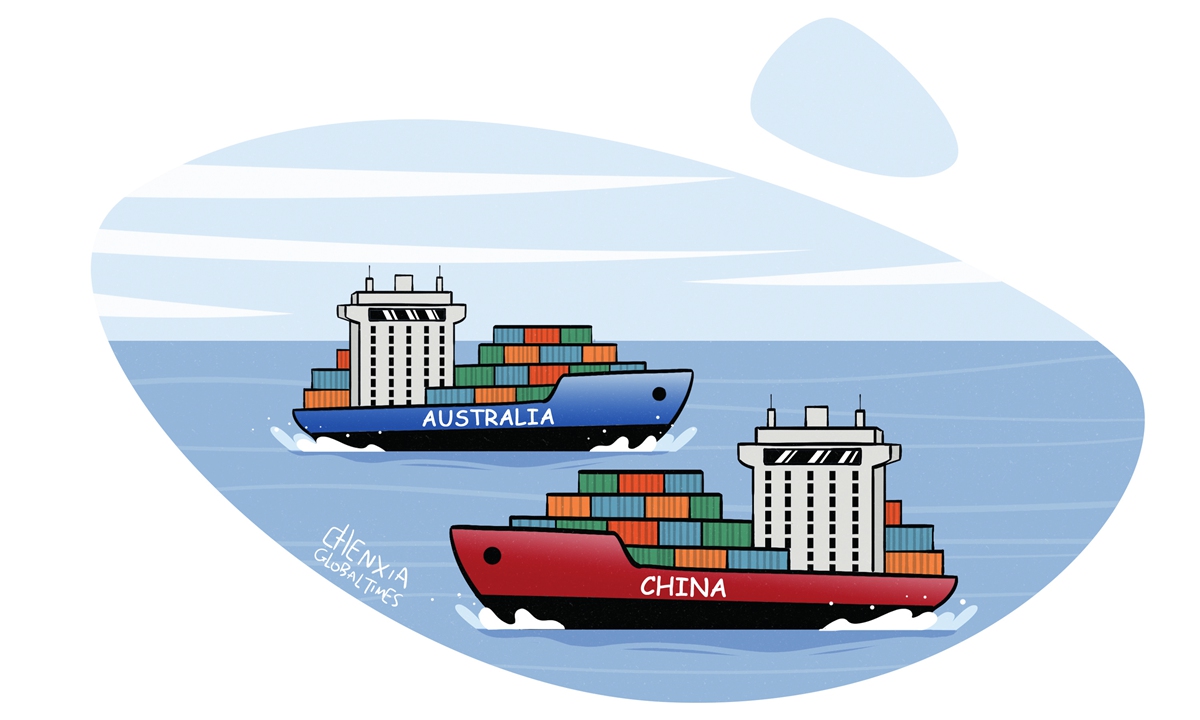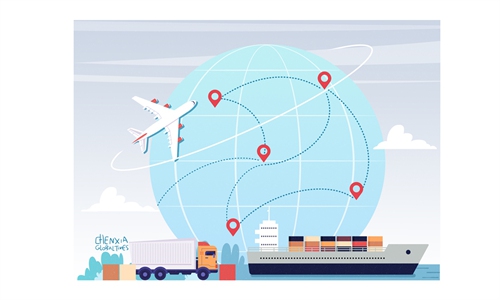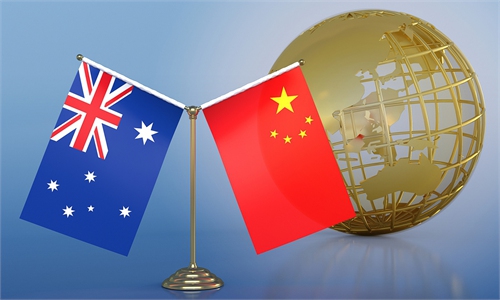
Illustration: Chen Xia/Global Times
While the China-Australia relationship has seen noticeable signs of stabilizing under the joint efforts of both countries, the China International Import Expo (CIIE), a world-class international business platform, presents opportunities for cooperation, adding to hopes that traders in both countries can make up for lost time and elevate bilateral trade to new heights.Chinese Foreign Ministry Spokesperson Mao Ning said on Monday that China welcomes Australian Prime Minister Anthony Albanese to visit the country and attend the 6th CIIE. As reported by Australian media outlets, Albanese is set to become the first Australian prime minister to visit China in seven years, and he has been urged to consider how the trip could bolster trade with China, Australia's largest trade partner.
Australia's GDP rose 0.4 percent in the June quarter, according to the Australian Bureau of Statistics, while per capita GDP declined 0.3 percent. Of the 27 economists polled by Australian website the Conversation who were asked to forecast the fiscal year that began in July, 12 said they think a recession is either more likely than not, or an even chance. Almost all expect a per-capita recession, in which economic growth fails to keep pace with population growth, sending living standards backward.
Notably, the August annual increase of 5.2 percent in the consumer price index was up from 4.9 percent in July. Growth in Australia's economic activity is forecast to remain subdued, as cost-of-living pressures and higher interest rates weigh on demand. Against the backdrop of stubborn inflation and sluggish domestic demand, changes in other countries' demand for Australian goods and services can have significant implications for the economy.
In 2020-21, China bought $168 billion of Australian exports, equal to 42 percent of Australia's total exports, Australia's official data showed. The figure highlights the huge potential for trade growth and the importance of the Chinese market for Australian exporters. To avoid an economic downturn, Australia urgently needs to further explore overseas markets and stabilize trade with China.
Trade and economic cooperation are key pieces of the puzzle for China-Australia relations, while the CIIE provides opportunities for an overall recovery in economic and trade ties. Since the first CIIE, more than 300 Australian companies and institutions have participated in the exhibition, which serves as an important platform for global companies looking to gain a foothold in the Chinese market, as well as those looking to reconnect with existing partners and deepen their networks in the world's second-largest economy. It is hoped that Australian companies do not miss this opportunity.
Although there were some setbacks in the past, China-Australia trade reached $220.92 billion in 2022, down 3.9 percent year-on-year, reflecting difficulties but hard-earned results that underscore the resilience of bilateral economic ties. As bilateral relations have stabilized, enterprises can use the CIIE as a platform to further strengthen mutually beneficial cooperation.
Exports are also an important factor driving China's development. In 2023, China rolled out policies dynamically to bolster growth, including that of foreign trade. The common willingness to strengthen cooperation and joint efforts for development are growing at a time when the global economy is facing an increasingly gloomy and uncertain outlook. China and Australia have a free trade agreement in force. Low trade tariffs and a high degree of liberalization can facilitate the development of trade between the two countries.
To cope with complex situations and problems, cooperation is the best way to resist risks. This is also why Australia should avoid falling into the "decoupling from China" trap the US has set. The US often sacrifices the interests of its allies in maintaining its hegemony. It's understandable that politicians in Washington don't want to see China-Australia relations return to a normal and mutually beneficial state. This will increase the difficulty for Australia to strike a balance between China and the US.
As reported by the VOA, Albanese left on Monday for a four-day visit to the US, hoping to make progress on the AUKUS nuclear submarine deal. It is estimated the agreement could cost Australia up to $244 billion and is widely seen as a counter to China's growing influence in the Asia-Pacific region.
It is sincerely hoped that Australia can handle relevant issues cautiously. Given the complex geopolitical situation where politicians in Washington focus increasingly on zero-sum geopolitical competition, if Canberra finds it difficult to strike a balance on the international stage, then promoting diplomatic relations toward a direction that is conducive to Australia's economic development and improving the lives of ordinary people, especially at a time when Australia faces economic challenges, should be one of the basic principles that serves Australia's interests.
The author is a reporter with the Global Times. bizopinion@globaltimes.com.cn



